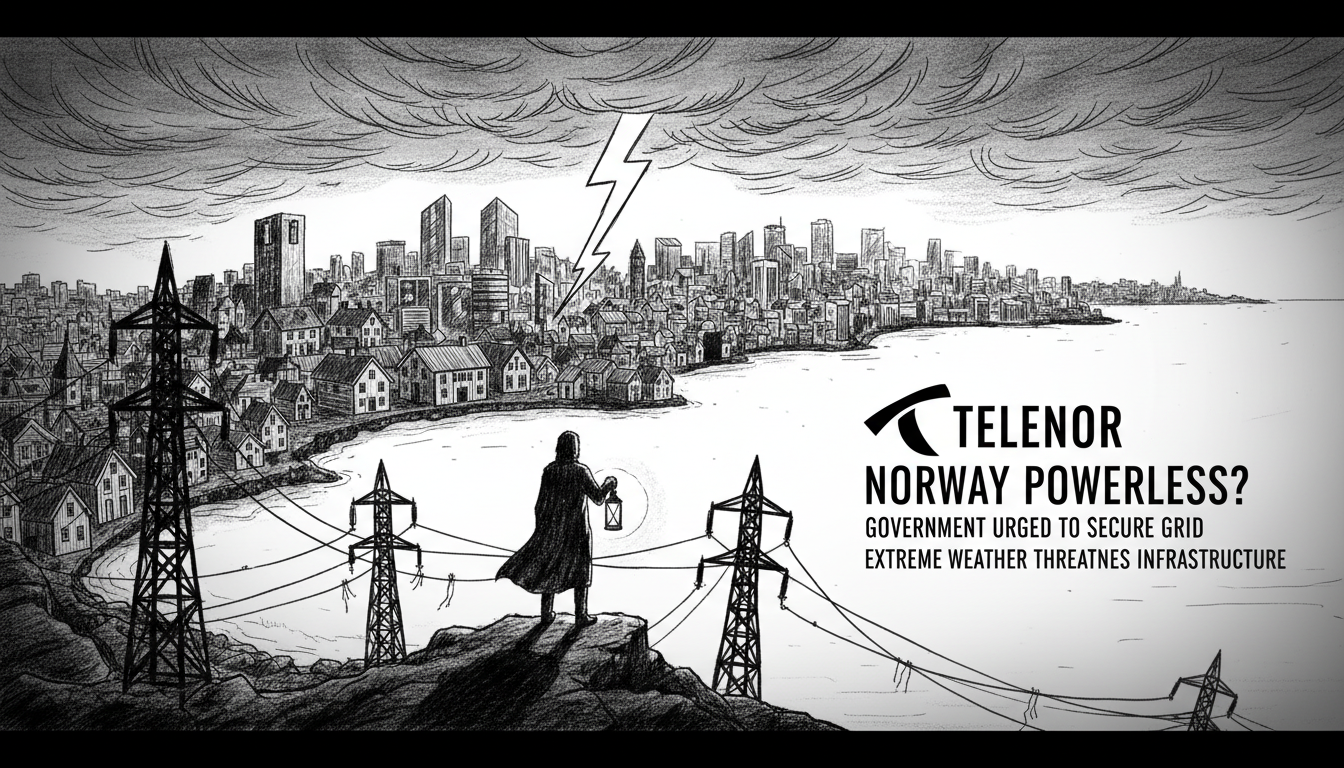Telenor Warns Norway Could Halt Without Electricity
Telenor's annual security report warns Norway could grind to a halt during prolonged power outages. The telecom giant urges stronger government action to secure electricity supplies as extreme weather tests national infrastructure. Their warnings contrast with the energy minister's confidence in Norway's power system reliability.

Telenor launched its annual security report on Wednesday with a clear message to authorities. Norway must take stronger action to secure power supplies. The report shows how power outages can severely impact mobile coverage, internet, healthcare and critical societal functions. It also reveals Norway lacks sufficient preparedness for extended power failures.
Christina Celeste Valstad from Ringerike was among 150,000 people who lost power during storm Amy in late September. Her family of seven went without electricity for 16 hours. They had to cook dinner for everyone on a single camping stove.
After experiencing 16 hours without power, she worries about longer outages. We only have an electric car. It cannot be charged during outages, so we become trapped. Mobile phones cannot be charged either. Food in refrigerators and freezers must eventually be thrown out. It's worse for those who need electricity for water supply, she explained.
Birgitte Engebretsen, CEO of Telenor Norway, issued a stark warning. We need a comprehensive effort to secure robust power supply. The government must step up because without electricity, everything stops.
Energy Minister Terje Aasland expressed less concern about power reliability. We have a strong and robust power system in Norway with 99.985 percent national delivery reliability, he wrote in an email statement.
Telenor operates 8,900 base stations ensuring mobile coverage across Norway. All run on electricity and switch to battery backup during outages. Government requirements mandate only 2-4 hours of battery backup. Some stations last slightly longer. When batteries drain, mobile coverage disappears.
During storm Amy, approximately 600 of Telenor's 8,900 base stations failed. This left many customers without mobile service. Power outages affect not just mobile coverage but all critical societal functions. Healthcare, financial services, water supply and other essential systems collapse when power fails.
Many Norwegians share these concerns. A recent YouGov survey for Telenor shows three in five Norwegians fear losing power for extended periods. The same number worry about losing water supply.
The energy minister defended Norway's preparedness. The power supply preparedness in Norway is good. Grid companies were well prepared for storm Amy. They mobilized quickly and worked systematically on repairs, he stated.
He noted that while up to 150,000 lost power during the storm's peak, the number dropped to 6,000 by Sunday evening. Grid companies are trained to handle severe weather and have responsibility for operation and restoration.
NATO has adopted seven resilience goals. Two specifically address robust power supply and civilian communication systems. These sectors are closely linked and crucial for national security.
NATO member countries have committed to spending five percent of GDP on defense. This includes 1.5 percentage points that can go to total preparedness, including civil infrastructure. This gives Norway a historic opportunity to invest in security across sectors, Engebretsen noted.
The government recently presented a National Security Plan for digital infrastructure. This is a very good starting point. It's high time Norway gets a long-term plan that prioritizes robust digital networks, the Telenor CEO said.
The government plans to double the expansion rate of reinforced electronic communication. This system provides some base stations with backup power for up to 72 hours. 102 municipalities already benefit from the scheme. 100 more will get reinforced electronic communication by 2030.
This is good, though we would have liked the plan to be even broader, Engebretsen said. She referenced Sweden's allocation of 6.75 billion SEK to strengthen electronic communication until 2030.
Telenor's security report draws lessons from Ukraine. Mobile operators there have maintained networks during war. It also examines experiences from Spain. A power outage in April 2025 paralyzed society for ten hours. Even driving cars and using toilets became challenging, according to reports.
These examples show both how vulnerable modern societies are to power outages and that it's possible to build more robust crisis-resistant systems.
We must prepare for the unthinkable. Robust power grids are not just a technical challenge but a strategic necessity, Engebretsen concluded.
The Telenor report states Norway faces an intensified threat landscape with increased geopolitical tension, extreme weather and digital dependency. Society becomes increasingly dependent on stable power and communication infrastructure.
Their message is clear: Norway needs a comprehensive effort to secure robust power supply and communication infrastructure. Without this, entire society could halt when crisis comes.
The contrast between Telenor's urgent warnings and the government's confident stance reveals a genuine disagreement about national vulnerability. With climate change increasing extreme weather events, this debate has real consequences for every Norwegian household.